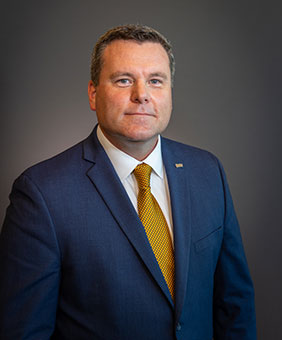National Adjutant Message

Barry A. Jesinoski, National Adjutant
DAV Caregivers Support is helping reduce burnout and stress
When we launched DAV Caregivers Support just over two years ago, we did so with a simple but principled belief: The people who care for our nation’s heroes deserve care and support themselves. These loved ones are often right behind and beside their veterans, quietly providing tireless support physically, emotionally and financially, often without recognition or rest.
Now, DAV is making it easier for them.
This program has become a wellspring of our mission to empower veterans to lead high-quality lives. Through tailored resources built for the challenges caregivers face, we’ve created a network of thousands of people, reminding these selfless individuals that they’re not alone and that a community stands ready to help.
Every day, caregivers across the country help with tasks many of us take for granted, such as preparing meals, providing transportation and offering personal care. Caregivers are spouses, children, siblings, and even close friends and neighbors. The common thread uniting them is love that is deep and lasting even on the hardest days.
With a tried-and-true support program behind them, caregivers and the veterans they love have found reduced stress, improved relationships and greater confidence that they won’t have to navigate complex caregiving responsibilities alone.
And the results are clear. Nearly 90% of caregivers enrolled in DAV Caregivers Support have improved or stabilized their depression and stress levels. More than half say they’re less likely to burn out after receiving our support. And real-world pressures like time, finances and logistics are eased, helping families maintain stability and quality of life.
DAV Caregivers Support is a two-way street. Not only do those who care for veterans qualify, but so do veterans who care for someone else. And like all of the services DAV provides, it’s offered at no cost.
The need for caregiving continues to grow, and so must our commitment. That’s why DAV has been instrumental in advocating for change on Capitol Hill. Congress passed the Senator Elizabeth Dole 21st Century Veterans Healthcare and Benefits Improvement Act just before the holidays in 2024. This effort by DAV, nearly two years in the making, means caregivers will have expanded coverage for nursing home care and increased access to mental health grants.
Caregiving reveals a love that endures through exhaustion, fear and grace. We think we understand love until someone needs all of ours. Our work continues, so if there’s a caregiver in your life, send them our way.
To learn more about DAV Caregivers Support or to register, visit davcaregivers.org.
If you want to find out more about the National Adjutant, you can find his biography here.
